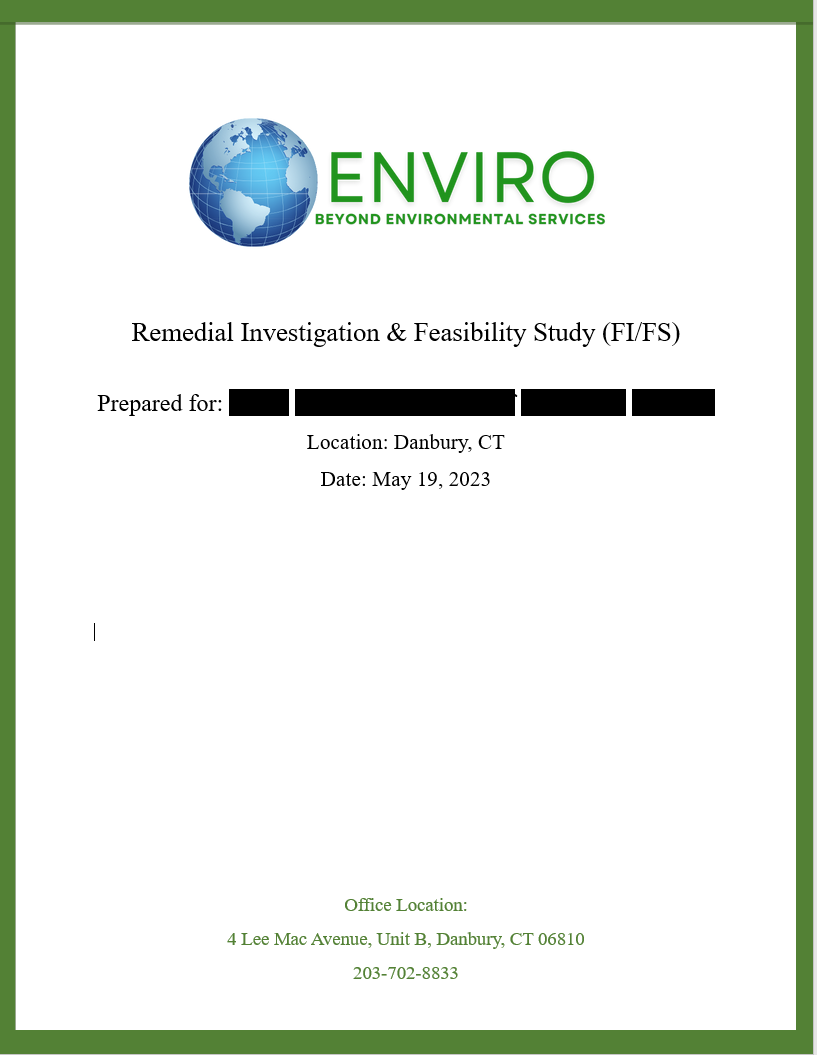
SERVICES
Phase I, II & III environmental site AssESSMENT
Phase I
Available to both public and private sector clients, Enviro performs American Society for Testing and Materials (ASTM) Comprehensive Environmental Site Assessments (ESA) for real estate transactions, property development, bank financing and refinancing, foreclosures, and other proactive audit program. These projects require a diverse expertise in geology, hydro-geology, engineering and risk assessment.
PHASE I ENVIRONMENTAL SITE ASSESSMENT
The purpose of a Phase I ESA is to gather sufficient information to develop an independent professional opinion about the environmental condition of the property and to identify actual or potential environmental contamination that may impact he value or progress of a property or project.
A Phase I ESA consists of the following four components: A thorough review of records, a site visit, interviews with the owner and/or operator of the property, and report documentation.
Review Of Records
The environmental professional will examine records that show previous transfer of ownership of the property and what the properties have been used for.
Site Reconnaissance
A site reconnaissance involves a visual inspection of the property and the surrounding properties. Pictures may be taken and some preliminary measurements may be conducted. However, testing for environmentally hazardous materials is not conducted in Phase I ESA.
Interviews
Interviews may be conducted with any persons or organizations that can be helpful by providing additional information on the property or surrounding properties. Additionally, meetings with local health departments, fire departments, water departments and/or other officials or management associations may be conducted.
Report
A written report will be completed by Enviro that will outline the findings from the Phase I ESA, including any conclusions that can be made about the property. If environmental contamination may be present, a Phase II ESA may be recommended.
A Phase II ESA is a more detailed investigation requiring sampling and analysis. The purpose of a Phase II investigation is to estimate the nature and extent of contamination and to provide the basis for a preliminary assessment of the cost for corrective and/or preventative action
Phase II & III
PHASE II ENVIRONMENTAL SITE ASSESSMENT
Phase II ESAs are designed and completed in accordance with the ASTM’s Standards while considering the unique goals, needs and budget of each client and project. The scope of work is designed to withstand the scrutiny of any parties involved, including lenders, regulators, attorneys, and peers. With a well-trained and licensed team and a wide in-house arsenal of specialized equipment for drilling, sampling, and monitoring, Enviro is ready to comply with all state and federal sampling and analysis protocol while having control over cost and scheduling.
PHASE III ENVIRONMENTAL SITE ASSESSMENT
Phase III ESAs are a necessary step in the environmental remediation process of contaminants from a property. A Phase III Assessment is conducted only after a Phase II ESA establishes the presence of contaminants. A Phase II continues this work and determines the extent of contamination on the property and will uncover the additional information necessary for remediation work. A Phase III ESA includes the development of a plan for remediation and a path forward to approval of all necessary local, state, federal agencies. A scope of work and options available for clean are developed, along with careful assessment of cost.
Remediation
REMEDIAL INVESTIGATION & FEASIBILITY STUDY
The Remedial Investigation & Feasibility Study (FI/FS) is a process focusing on defining the nature and extent of contamination, assessing the risk to human health and the environment, and developing a cleanup strategy to eliminate potentially harmful human health and environmental impacts.
Enviro has performed Remedial Investigations/Feasibility Studies (RI/FS) under CERCLA, parallel RCRA investigations and state level corrective action protocols. These projects required Enviro’s diverse expertise in environmental engineering and allowed us to showcase our ability to develop strategies consistent with our clients' objectives, in accordance with applicable laws and guidance documents.
Whether under RCRA, CERCLA, or similar state laws, developing and conducting a site investigation and feasibility study generally includes the following:
Project scoping and planning
Data collection
Risk assessment
In developing a solution to an environmental concern, the most cost-effective approach results from an unbiased evaluation of the available technologies. Enviro’s extensive project experience in applying remediation technologies, combined with multi-disciplined engineering resources, allows Enviro to consistently select the most cost-effective and technologically sound solution.
Specialized Remediation Technologies
Innovative technologies for site assessment and remediation are at the center of reducing cleanup costs and improving the services Enviro' provides to its clients. Enviro has tested and implemented various chemical oxidation, metal reduction/stabilization, and other innovative remedial approaches. As an example, there are many technologies that, if implemented in a bundled fashion, can allow for remediation to be accomplished in an accelerated time frame.
Enviro is not bound to promote the application of any single remediation technology. We offer our clients an overall best solution that considers regulatory, business and technical issues. We are continually working to establish strategic alliances with other service providers to enhance our abilities to provide latest innovations in remediation technologies.
Treatability studies pilot tests
Alternatives analysis
underground storage tank services
UST Services
Enviro Professionals have extensive experience working with regulators at local, state and federal levels. We have specially trained professionals who exclusively focus on issues related to petroleum site investigation and remediation. Our team is experienced in managing sites through several state Underground Storage Tank (UST) Petroleum Clean-Up Program reimbursement programs.
Enviro has completed applications and successfully closed many sites to the satisfaction of regulatory agency remediation criteria. In addition, Enviro’s UST professionals have performed site assessments and remedial investigations at petroleum facilities ranging in size from single UST facilities to large bulk storage terminals. The data collected from these investigations has been used for property transfer as well as remedial design. Enviro has designed and installed remedial systems that have incorporated technologies such as pump and treat, air sparging, in-situ bio remediation techniques, excavation, soil vapor extraction, and dual phase extraction.
dewatering & treatment
DEWATERING & TREATMENT services
Dewatering is a term used to describe the process of extraction and removal of groundwater or surface water from a construction site. The presence of undesired water in a construction site can lead to safety risks, increased costs, and unnecessary delays in a project. The right techniques to control, manage, and remove water is critical in projects that involve excavation below the static groundwater level, for example, sub-surface parking structures.
This process consists of extracting the groundwater at the site with the use of wells or sumps so that groundwater level is drawn down until a steady, dry state of the soil is reached and excavation and construction below natural ground water levels can be conducted in dry stable conditions. Oftentimes, the groundwater recovered from a dewatering project is contaminated and will require treatment.
A wide variety of methods are available to control groundwater during an excavation. Selecting the right method is a critical step in any project. Our professionals have the experience to carefully assess the unique conditions of each job, enabling us to ensure you select the most suitable and cost effective solution.
contaminated media management
CMM services
As a part of our turnkey capabilities, Enviro provides comprehensive services to support the management, coordination and disposal of hazardous and non-hazardous wastes.
Waste materials may include soil, water, or other wastes resultant from manufacturing, industrial, commercial and remediation processes. Enviro owns and maintains a fleet of transportation and loading equipment to allow for containerization and transportation of waste streams to end disposal facilities.
Enviro professionals are skilled and experienced in evaluating and characterizing waste streams for disposal purposes. Our waste transportation and disposal coordinators are well versed in federal, state, and local regulations that govern the generation, storage, management, transportation and disposal of wastes. We can coordinate disposal services either on a brokered basis, or provide our clients with direct billing service by the disposal location.
environmental compliance
environmental compliance services
Enviro has the ability to respond to and meet both routine and complex project needs in an array of the service areas. Specifically the company has experience in the following areas:
Auditing/compliance benchmarking
Review of releases and threats of releases of hazardous materials
Air emissions, storm water, wastewater, and solid waste permitting
Determination of the overall regulatory compliance status of facilities
Analysis and identification of environmental condition of properties/buildings
Enviro has performed fast tracked compliance assessments that included permit operability, analysis, process hazard assessments and assessment of emergency response and contingency plans. Leveraging our science, engineering and business knowledge, Enviro brings extensive knowledge of compliance issues related to: industrial water and wastewater treatment, solid waste management, emissions characterization, monitoring and permitting, hazardous materials, and hazardous waste management, safety, and industrial hygiene.
We have assisted our clients in quickly identifying permitting requirements, and have developed all required documentation to support permit preparation and submission. ECR staff are familiar with the varied types of permits that might be required to support construction projects in areas of wetlands and construction site dewatering. As an example, we have performed projects that have required clients to obtain permits and/or authorizations from state agencies, US Army Corps of Engineers, USEPA and local fire departments and conservation commissions.
asbestos abatement
Asbestos abatement services
ct Abestos abatement contractor license #000820
While asbestos has been banned for use in the United States since 1978, many builders and manufacturers were allowed to use it until as late as 1986. Popular for use in flooring, finishes, insulation, fire proofing, roofing, adhesives, and wall and ceiling materials, some reports show that up to 30 million homes and commercial buildings in the United States still contain asbestos containing materials.
A properly trained and licensed professional is necessary for safe asbestos abatement, removal and disposal, as exposure to this carcinogen is extremely dangerous and can result in a multitude of health concerns.
Asbestos abatement does not always necessitate removal, because when asbestos is undisturbed and intact, it can often be kept in place with minimal risk of exposure. The expertise of a licensee and trained professional, fully versed in all local, state, and federal laws, should be engaged to make this determination for any project.
mold services
mold testing & removal
Indoor mold is a serious environmental hazard. Mold can quickly multiply in the right environmental conditions, releasing airborne particles that can cause damage and threated the health of any humans or animals exposed. Mold can be found nearly anywhere and can grow on virtually any surface, often hidden, when enough moisture is present.
Investigating potential mold problems can be challenging and requires expertise in order to not unnecessarily disturb potential growth sites and, as a result, trigger the release of spores.
Enviro Professionals are equipped to accurately test for mold and remove it safely and quickly.
Demolition
demolition services
EnviroConsultants holds a Class B Demolition License #DMCR003286
Enviro professionals using their extensive expertise in Construction and Environmental Demolition, cater projects to each client’s specific needs and budget. Our fully trained and licensed crews know how to maintain a safe environment while maintaining job production. Our access to our inhouse fleet of specialty equipment allow us to professionally, efficiently, and appropriately address environmental needs that arise as a demolition project progresses.






